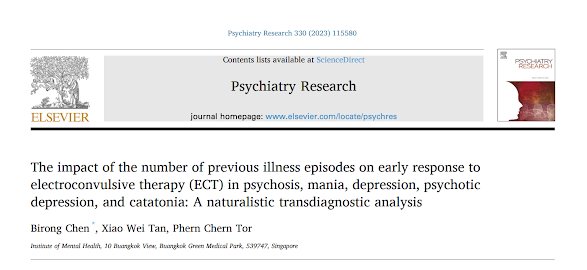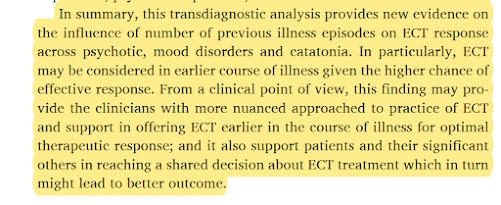Prior Episodes and ECT Response: New Data From Singapore
The impact of the number of previous illness episodes on early response to electroconvulsive therapy (ECT) in psychosis, mania, depression, psychotic depression, and catatonia: A naturalistic transdiagnostic analysis.
Psychiatry Res. 2023 Oct 30;330:115580. doi: 10.1016/j.psychres.2023.115580. Online ahead of print.PMID: 37926055
The abstract is copied below:
Electroconvulsive Therapy (ECT) is an effective treatment for mood and psychotic disorders but there is growing evidence of treatment resistant to ECT. Our study aimed to investigate the relationship between the number of previous illness episodes and the symptomatic improvement after acute ECT treatment. We conducted a retrospective naturalistic cohort analysis of patients' ECT registry data from March 2017 to February 2023. We categorized the number of previous illness episodes into "0-3″ and ">3 episodes", paired T-tests were used to compare the changes in scores of clinical assessments, generalized linear models were used to analyze the association between the number of previous illness episodes and change in symptomatic scores. A total of 1137 patients were included for analysis. There was a significant global improvement in psychiatric symptoms (CGI) after 6 ECT treatments across five indications. We observed that compared to patients with less previous illness episodes, patients with more than 3 previous illness episodes had 30% lower chance of response to acute ECT treatment. Thus, our study suggests that use ECT earlier in the course of illness is associated with greater response and support offering ECT earlier in the disease course.
Keywords: Bipolar disorder; Clinical global impression -improvement; Clinical global impression -severity; Depression; Electroconvulsive therapy; Number of previous illness episodes; Schizophrenia.
The article is here.
And from the text:
I hope blog readers will read this paper carefully and comment.
Kudos to Drs. Tor and colleagues for this important contribution to the ECT literature.






Comments
Post a Comment